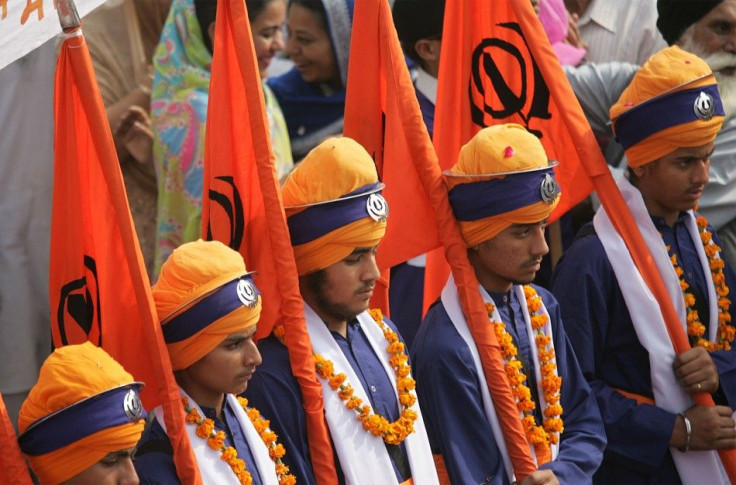Balwant Singh Rajoana Execution Postponed : Why Sikh Protesters Defended Assassin

Saffron flags fluttered from Patiala, India to Birmingham, England on Wednesday as Sikhs around the world protested the scheduled execution of Balwant Singh Rajoana. The protests succeeded, and plans to impose capital punishment on Rajoana have been postponed.
The prisoner was scheduled to be executed this weekend for his involvement in the 1995 assassination of Punjab Chief Minister Beant Singh. Rajoana was one of many conspirators in the murder, which was ultimately carried out by Dilawar Singh.
The assassins were members of the Babbar Khalsa organization, a radical militant Sikh group that opposed the anti-separatist policies of Chief Minster Singh. Rajoana admits involvement as a back-up bomber in case the first attempt failed, and has never appealed his sentence.
Wednesday's protests in his defense evince a longstanding tension between Sikhs and other religious groups in India.
Mounting the Defense
The Punjab uprising began when a Chandigarh court set a March 31 date for the execution of Rajoana, who had been sentenced to death by the Central Bureau of Investigation back in 2007. This would have been the country's first capital punishment since 2004, according to BBC.
Officials at the Patiala Jail in Punjab, where Rajoana is held, objected to the court ruling. They argued that a Sikh-sponsored petition for clemency was awaiting approval by Indian President Pratibha Patil. The court, however, was resistant to the postponement demands of jail officials.
In response, Sikh leaders in Punjab called for a statewide bandh, or strike, to agitate for the suspension of the execution. The Times of India reports that shops, business and schools were closed for the day in major cities across Punjab. Transportation and commerce were disrupted throughout India as a result. Even Sikhs as far as France, Italy, Switzerland and Germany closed their doors.
In Birmingham, England, a 200-person march organized by the Sikh community proceeded from Handsworth to the Indian Consulate.
Now, following a Wednesday evening meeting between Patil and the chief minister of Punjab, the president has intervened and Rajoana's execution has been stayed, reports the Hindustan Times.
A History of Conflict
Sikhism is a religion founded in northern India in the 1460s. From the beginning, adherents were subject to persecution; three out of ten early religious leaders, called Gurus, were executed by Indian politicians. This motivated many Sikhs to advocate for greater militancy.
Since then, the community has endured a long history of sporadically intensifying conflicts with its mostly Hindu and Islamic neighbors.
British colonialism proved a mixed bag for the Sikh community. After initial conflicts, the Sikhs enjoyed better relations with their occupants than did other groups in India, eventually becoming known for their exemplary service in the British Army.
The shaky camaraderie fell apart in 1919, when British troops conducted a massacre in the Sikh holy city of Amritsar. Suddenly, the Sikhs were at the forefront of India's struggle for freedom, and this has given the group a measure of cultural prominence in India ever since -- despite the fact that upon achieving independence from the British, Sikhs favored their own independence were reluctant to join the state of India. Some of the more disaffected members of the religious community still favor Sikh succession to form an independent state called Khalistan.
Ongoing Tension
The most significant upheaval of modern times occurred in 1984, when Indian troops under then-Prime Minister Indira Gandhi responded to instances of militancy by attacking a revered Sikh temple in Amritsar. Many in Punjab were incensed, and Gandhi was later assassinated by two Sikh bodyguards. This prompted violent riots across India. Some human rights groups estimate that the Sikh death toll fell between 10,000 and 17,000.
Although hostilities are still apparent, they are tempered by Sikhs' strong presence in Indian culture. India Census data reports that Sikhs make up less than 2 percent of the population, but they constitute a highly influential community. Punjab, where most Sikhs reside, is India's most wealthy state. The Prime Minister Manmohan Singh himself is a Sikh, as are many army members and government officials.
But those who protested the scheduled execution of Rajoana still feel that Sikhs are unfairly persecuted by the Indian government. Despite the fact that Rajoana himself did not ask for clemency, many Sikh activists across the world considered him a living martyr and used his death sentence as a rallying point in their struggle for greater freedom and independence.
© Copyright IBTimes 2025. All rights reserved.






















